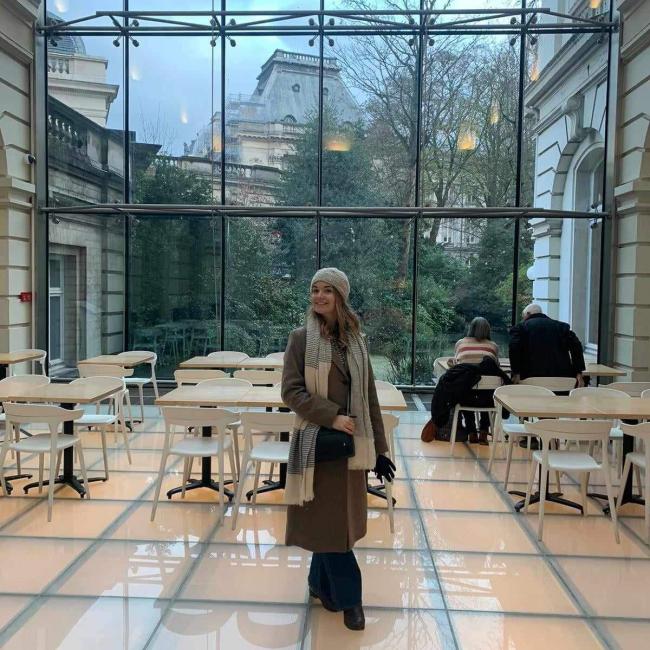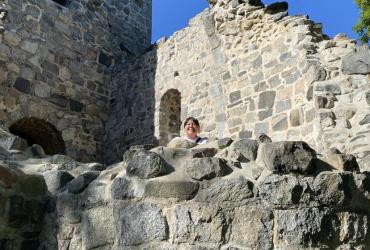Orientation and First Weeks
My university organized events for international students and people in my program. Be sure to attend those in your first weeks for a good start and to make useful connections. I joined an international program (CGSP) which was extra helpful with immigration questions. They provided advice on residence permits, required insurance, and the public transit system.
Accommodation and Living
I paid 405 euros per month, utilities and furniture included, for a room in a family home in the center of Cologne. This was a pretty good deal considering the location (less than 10 minutes from the University), but not considering the control. I stayed with a married couple, their adult daughter, and three other exchange students. Per their ad, I expected a very welcoming family that would make us internationals feel wanted and help us acclimate to the city. What I found was rather many rules and the feeling of only being wanted for the rent I paid. I could rant about this, but won't. You're always gambling when planning to live with other people, so be sure to ask about all the logistics of signing a contract. Here are the questions I should've asked:
- What are your policies about having guests, both during the day and overnight?
- What are your house rules/expectations of renters? (How are common spaces shared, cleaning expectations, quiet hours...)
- Are there any extra costs? (they had us pay 2 euros per load of laundry, which adds up, financially, and to the feeling of being wanted only for your money)
- How do you treat utilities? (Germans are known for being careful with utility use. We didn't have any heat in common spaces all winter)
- Anything else I should know? (This is not normal, but on my first day, the landlord told me not to open the door to their son who was "crazy" (he had schizophrenia and drug problems). The son came a couple of times and all was good, and he ended up leaving the country or was in prison for most of my time there, but that was definitely something I should have been told beforehand.)
As one who lives a calm life, it was partially nice having the owners set and enforce rules which meant I had clean common spaces and a quiet house at night, without any awkward roommate talks. My roommates and I also united over our grievance with the owners. Just make sure you know what you're getting into. And then hold anyone involved to the terms of the contract. If it wasn't stated before, they can't hold you to it. Know your rights as a tenant.
Day to Day
I enjoyed living the city life, which was new to me. It was nice trying new things every time I went to the supermarket or passed the bakery by my house. I loved and hated the trams. They were convenient and free for students, but certain lines were SO crowded. As a small-town Canadian, this was a struggle for me and where I had my first ever panic attack...
I loved that every day was a learning opportunity. At the minimum, I'd be improving my language, but there was always something new to see or learn.
Find out where the international student events are happening. This was a great way for me to get connected, both socially, and for daily living. Not knowing where you can buy something simple, or get a service, can be upsetting and uncomfortable. Having people around you in similar experiences to support one another is a huge help. I loved being an international student. I had a shared experience with people from all over the world. I did the math and found I connected with people from at least 35 different countries. This doesn’t just happen, however. I had some Australian friends who found an Australian group and made little connections outside of that. That was comfortable.
Learning and Adaptation
Part of the reason I wanted to do an exchange was to face the challenge of being on my own in an unfamiliar place, which I knew would confront me with new ideas. Growth happens in such conditions. If you have such a mindset, the challenges will be just as hard, but not necessarily bad as you realize how much you benefit from it. The hardest moments are often what you learn the most from.
The most unusual thing about the school system is probably the calendar. The semester goes longer than the typical Canadian one. The early semester is in September and the regular semester is from October to February). There are options for having an early leave but I recommend a longer stay.
Accomplishments and Challenges
I feel this is strewn throughout my post, but simply going on exchange is the biggest accomplishment. After going through all the obstacles to get there: immigration, funding, applying, etc., it's so amazing to finally be there.
Cultural and Environmental Observations
One of the first things I noticed was the drinking culture. It's legal to be drinking and intoxicated in public in Germany, which is rather contradictory to their stereotypical, structured and organized system.
Do pursue, comfort, you need some, but remember why you’re there! My form of pursuing comfort was going to church. I went to both a German and English-speaking church, but partway through decided to put more energy into the English-speaking one as I found myself needing deeper connections that weren’t so easy to get with my limited German. Had I pushed through, my German skills would be much better now, but I believe I made the right choice. I’ll add here that fluent English speakers are so fortunate. Most places you go you’ll be able to find community, and they don’t even need to be from the same country. As English is “the international language,” attending an English-speaking (International Baptist) church meant that I was among about 40+ nations! My bible study group had 13 nations represented one evening. A couple were Ukrainian: a young man who’d left Ukraine a couple of years ago and was separated from his brother, and a woman who’d occasionally return to be with her mother, and requested prayers while they hid in a bomb shelter. This is what I wanted out of my exchange: To see the world not for stories on the news, but for the people who lived the stories. My world expanded while I was there, and it certainly feels smaller upon returning, but I’ll always be changed by my time there.
Social and Extracurricular Activities
In Cologne specifically, I found social media very useful for finding events and making the most of my time. I followed “Mr_Koeln,” “mitvergnuegenkoeln,” “rausgegangenkoeln,” and “esnkoeln.” You can likely switch out “Koeln” (Cologne) of the latter three and insert the name of whatever German city you’re in and find relevant pages. Rausgegangen, for instance, has an app that compiles the events of the location you enter. ESN is a large organization that hosts events for international/Erasmus students. I encourage you also to follow news channels of where you live, like “ksta_koeln.” It’s easy to isolate yourself as an international student and not involve yourself in the actual life of a German. I found most of my immersion through German church, but a little bit through school (I was in a program with mostly international students), a language café (Sprachcafe) I attended through the university, and the university sports program (UniSport).
Germany has so many benefits for students: major discounts at the cafeterias (mensa). I’m talking a full chicken leg, mashed potatoes, hot veggie, and a side salad and dessert of your choice for 3.50€. There are often student discounts for non-university-related events. And the sports: there are so many activities to do, indoor and outdoor, team sports and individual, water sports and snow sports. For some of the bigger activities, you pay an accordingly large fee, but there’s so much available to students if you pay (in my case) 12€ for the semester. I attended volleyball, Zumba, and immediately after the semester, a beginner's ballet class! There were many fighting sports, which I wished to try out but never got around to. The provinces can vary on their student care perhaps more than I know, so it may not be as good elsewhere, or perhaps it’s better. Europe in general also likes to take care of its students. As a resident of Germany, I was able to enter all museums in Paris, including Versailles, for free.
Wrap Up
Read the tips exchange students have. I wish I did. But there's so much to discover for yourself, so enjoy the newness and discovery of everything.















